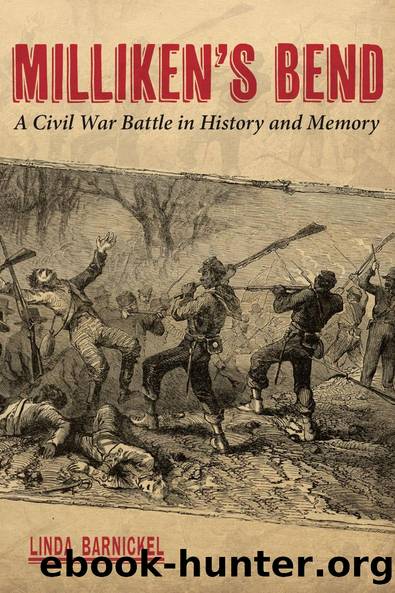Milliken's Bend by Linda Barnickel

Author:Linda Barnickel [Barnickel, Linda]
Language: eng
Format: epub
Tags: History, United States, Civil War Period (1850-1877), Social Science, Ethnic Studies, American, African American & Black Studies, Slavery
ISBN: 9780807149942
Google: V29Y1nthQJIC
Publisher: LSU Press
Published: 2013-04-15T01:41:29+00:00
-7-
âThis Battle Has Significanceâ
Millikenâs Bend and the Wider War
MILLIK ENâS BEND, although one of the smaller actions of the war, nevertheless is important for three main reasons. First, along with Port Hudson and Fort Wagner, Millikenâs Bend helped change attitudes and answered in the affirmative the question of whether black troops would fight. Secondly, it was sometimes invoked to aid recruiting, particularly among literate, free blacks in the North, showing them that if former slaves were willing to fight, then they, too, should be ready to enlist to help their Southern brothers. Finally, and most importantly, the capture of a number of officers and enlisted men at Millikenâs Bend and elsewhere in Louisiana that summer brought the Confederate treatment of soldiers from the Colored Troops into the forefront, ultimately resulting in the cessation of prisoner exchanges.
Immediately after Millikenâs Bend, abolitionists reaffirmed and even skeptics were persuaded that African Americansâeven those who had been former slavesâcould make good soldiers. Even Confederate brigadier general Henry McCulloch praised the black soldiersâ tenacity at Millikenâs Bend. In the North, as word spread about the repulse of the Southerners by the raw brigade of former slaves, Millikenâs Bend was trumpeted as proof that black men would fight, and fight well. Union colonel Isaac F. Shepardâs report, for example, glowed with pride. âI think there will be a future that will make this first regular battle against the blacks alone honorably historic. The best of all is our troops are not demoralized by the sad result to them. Not at all disheartened. Indeed they have risen with the event, and proudly walk with a loftier tread then [sic] before.â1
White soldiers who had been skeptical were now converted. With an attitude typical of many whites at the time, a convalescing Union soldier wrote just prior to the battle, with apparent sarcasm, âDid I ever tell you there is a Negro brigade a couple of miles up the bend, valiant soldiers? It would amuse you to see them drill.â Two days after the battle, he was more enthusiastic: âAll are astonished at their fighting qualities⦠They have proved themselves worthy of the name of soldiers.â2
About a month after Millikenâs Bend, and immediately after the surrender of Vicksburg, Benjamin Stevens left the 15th Iowa Infantry to become an officer in the 10th Louisiana Infantry, African Descent. He wrote his mother in late July that âthe thing is demonstrated, the nigger will fight.â Among paroled Confederates at Vicksburg, he found the Rebels more willing to fight two regiments of white soldiers over one regiment of blacks. âRebel Citizens fear them more than they would fear Indians,â he wrote. Although Stevens had become an officer in the Colored Troops, he nevertheless expressed his preference for the war to remain one for the restoration of the Union, rather than for the abolition of slavery. But he supported the use of former slaves as soldiers against the Confederacy, seeing it as a practical matter: âWe are using their own strength against them.â3
Chaplain George G.
Download
This site does not store any files on its server. We only index and link to content provided by other sites. Please contact the content providers to delete copyright contents if any and email us, we'll remove relevant links or contents immediately.
| United States | Abolition |
| Campaigns & Battlefields | Confederacy |
| Naval Operations | Regimental Histories |
| Women |
In Cold Blood by Truman Capote(3373)
The Innovators: How a Group of Hackers, Geniuses, and Geeks Created the Digital Revolution by Walter Isaacson(3123)
Steve Jobs by Walter Isaacson(2885)
All the President's Men by Carl Bernstein & Bob Woodward(2361)
Lonely Planet New York City by Lonely Planet(2206)
And the Band Played On by Randy Shilts(2183)
The Room Where It Happened by John Bolton;(2144)
The Poisoner's Handbook by Deborah Blum(2126)
The Innovators by Walter Isaacson(2096)
The Murder of Marilyn Monroe by Jay Margolis(2089)
Lincoln by David Herbert Donald(1979)
A Colony in a Nation by Chris Hayes(1919)
Being George Washington by Beck Glenn(1882)
Under the Banner of Heaven: A Story of Violent Faith by Jon Krakauer(1787)
Amelia Earhart by Doris L. Rich(1684)
The Unsettlers by Mark Sundeen(1681)
Dirt by Bill Buford(1665)
Birdmen by Lawrence Goldstone(1658)
Zeitoun by Dave Eggers(1636)
